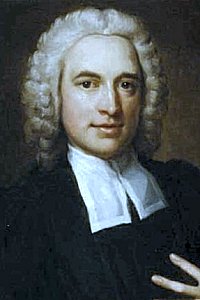Introduction

Words: Charles Wesley,Hymns for the Year 1756.
Music: Falkirk, from Thomas A. Arne (1710–1778) (🔊 pdf nwc).

The day of God, wherein the heavens being on fire shall be dissolved, and the elements shall melt with fervent heat.
2 Peter 3:12

Words: Charles Wesley,Hymns for the Year 1756.
Music: Falkirk, from Thomas A. Arne (1710–1778) (🔊 pdf nwc).

The earthquake referred to was that which destroyed the city of Lisbon on November 1, 1755; the plague had reference to a fatal disease that had been destroying the cattle by the thousands; and the war referred to was the threatened invasion of the French, which was imminent at that time.
These three circumstances gave unprecedented solemnity to the fast day that called the people to public confession on February 6, 1756. Wesley makes the following entry in his journal for this date:
The fast day was a glorious day, such as London has scarce seen since the Restoration. Every church in the city was more than full, and a solemn seriousness sat on every face. Surely God heareth the prayer, and there will yet be a lengthening of our tranquility. Even the Jews observed this day with a peculiar solemnity.
Nutter, p. 311
Stand the omnipotent decree!
Jehovah’s will be done!
Nature’s end we wait to see,
And hear her final groan.
Let this earth dissolve, and blend
In death the wicked and the just;
Let those ponderous orbs descend,
And grind us into dust.
Rests secure the righteous man;
At his Redeemer’s beck,
Sure to emerge and rise again;
And mount above the wreck;
Lo! the heav’nly Spirit towers,
Like flames o’er nature’s funeral pyre,
Triumphs in immortal powers,
And claps His wings of fire.
Nothing hath the just to lose,
By worlds on worlds destroyed:
Far beneath his feet he views,
With smiles, the flaming void;
Sees this universe renewed,
The grand millennial reign begun;
Shouts with all the sons of God,
Around th’eternal throne.
Resting in this glorious hope
To be at last restored,
Yield we now our bodies up
To earthquake, plague, or sword;
Listening for the call divine,
The latest trumpet of the seven,
Soon our soul and dust shall join,
And both fly up to Heaven.